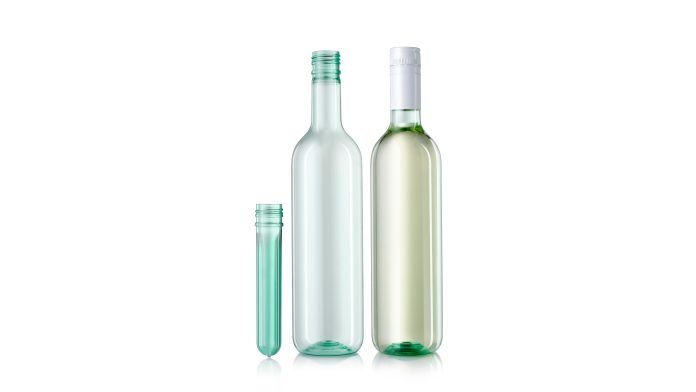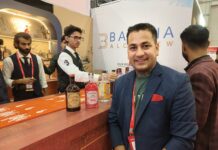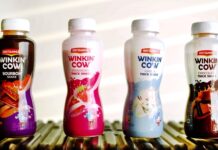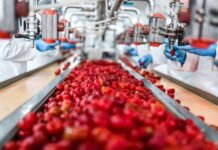
Plastic packaging specialist ALPLA is launching a “safe, affordable, sustainable and recyclable” wine bottle made of PET. The bottle weighs approximately only an eighth of a glass bottle, reduces the carbon footprint by up to 50% and allows for price savings of up to 30%, the company says. It can be made entirely of recycled PET (rPET). The packaging solution is available now in 0.75-litre and 1-liter bottle sizes and is already being used in Austria by the pilot customer and development partner Wegenstein.
The 0.75-litre bottle weighs just 50 grams – around eight times less than the alternative made of glass. The first white wine bottles belonging to the Wegenstein winery recently went into circulation in the Austrian wine market, making them part of the Europe-wide bottle-to-bottle loop. The sustainable solution reduces carbon consumption by 38% compared to the glass alternative – and that’s even without rPET content. The PET bottle is now also available in a 1-liter version. ALPLA plans to already be manufacturing several million units a year from 2025 and is planning solutions made entirely of rPET.
“PET is light, unbreakable and recyclable, and can be molded with little energy needed, making the plastic the ideal packaging solution. With it, winemakers can improve their environmental footprint and lower their costs,” emphasizes Daniel Lehner, global sales director, Food & Beverage at ALPLA. The plastic packaging meets all the quality requirements, is available as a transparent or a green bottle and is suitable for all types of wine.
Sustainable, inexpensive and compatible
The lower material consumption and energy-saving manufacturing reduce carbon consumption. The use of rPET further increases the reduction. Even with 30% rPET, 43% is saved, while the ecological footprint of the solution made of 100% rPET is even halved at minus 50%. The recycled material is provided by ALPLA from its own ALPLA recycling recycling plants. The low weight of the packaging also has positive effects on shipment. And there is a cost advantage too. ALPLA’s PET wine bottles are up to 30 per cent less expensive than glass bottles, depending on the requirements.
The sustainable packaging solution works with conventional metal screw caps and is compatible with winemakers’ bottling lines, meaning it is flexible. Wegenstein fills the PET bottles on the same bottling lines as its glass bottles. ‘The bottle has been perfectly tailored to the bottling and shipment processes. The close cooperation with the Wegenstein team significantly sped up the market launch,’ reports Sebastian Rosenberger, project manager at ALPLA. “The PET bottle lives up to what it promises. It is visually appealing, ensures our quality and is practical. We are making an innovative offer to consumers who care about our environment and our climate,” explains Herbert Toifl, managing director of the Wegenstein winery.
IndiFoodBev — authentic, impactful and influential
An English-language food and beverage processing and packaging industry B2B platform in print and web, IndiFoodBev is in its third year of publication. It is said that the Indian food and beverage industries represent approximately US$ 900 billion in revenues which implies more than 20% of the country’s GDP. Eliminating the wastage on the farmside can help to deliver more protein to a higher number of the population apart from generating sizable exports. The savings in soil, seeds, water, fertilizer, energy and ultimately food and nutrition could be the most immense contribution that country is poised to make to the moderation of climate change.
To improve your marketing and grow sales to the food and beverage processing and packaging industry, talk to us. Our research and consulting company IppStar [www.ippstar.org] can assess your potential and addressable markets in light of the competition. We can discuss marketing, communication, and sales strategies for market entry and growth.
Suppliers and service providers with a strategy and budget for targeted marketing can discuss using our hybrid print, web, video, and social media channels to create brand recognition linked to market relevance. Our technical writers are ready to meet you and your customers for content.
The second largest producer of fruit and vegetables in the world is continuously expanding processing capacities and delivery systems with appropriate innovative technologies. We cover product and consumer trends, nutrition, processing, research, equipment and packaging from farm to thali. Get our 2025 media kit and recalibrate your role in this dynamic market. Enhance your visibility and relevance to existing markets and turn potential customers into conversations. Ask for a sample copy of our bi-monthly in print or our weekly IndiFoodBev eZine each Wednesday.
For editorial info@ippgroup.in — for advertisement ads1@ippgroup.in and for subscriptions subscription@ippgroup.in
Naresh Khanna – 10 February 2025
Subscribe Now










